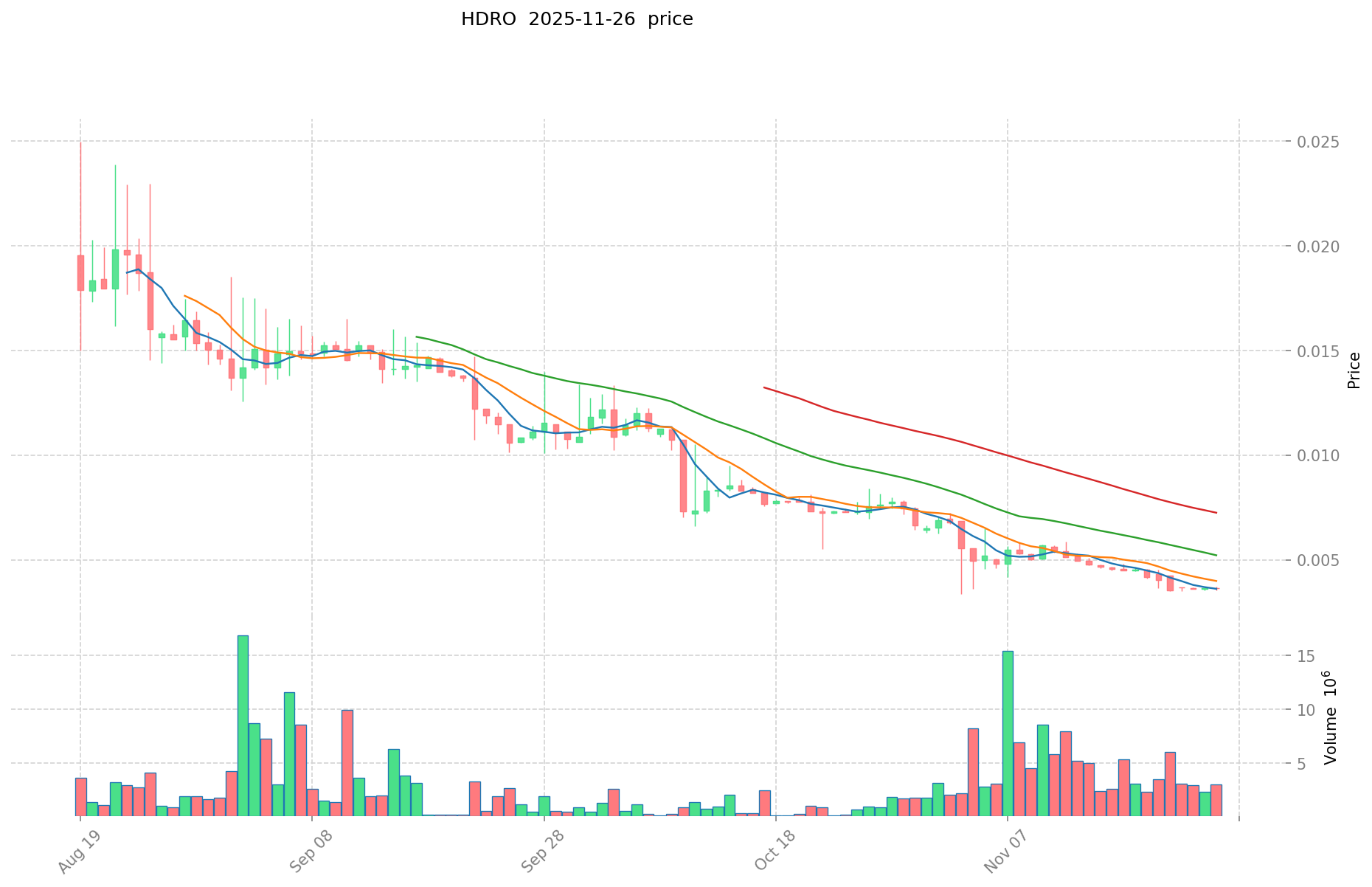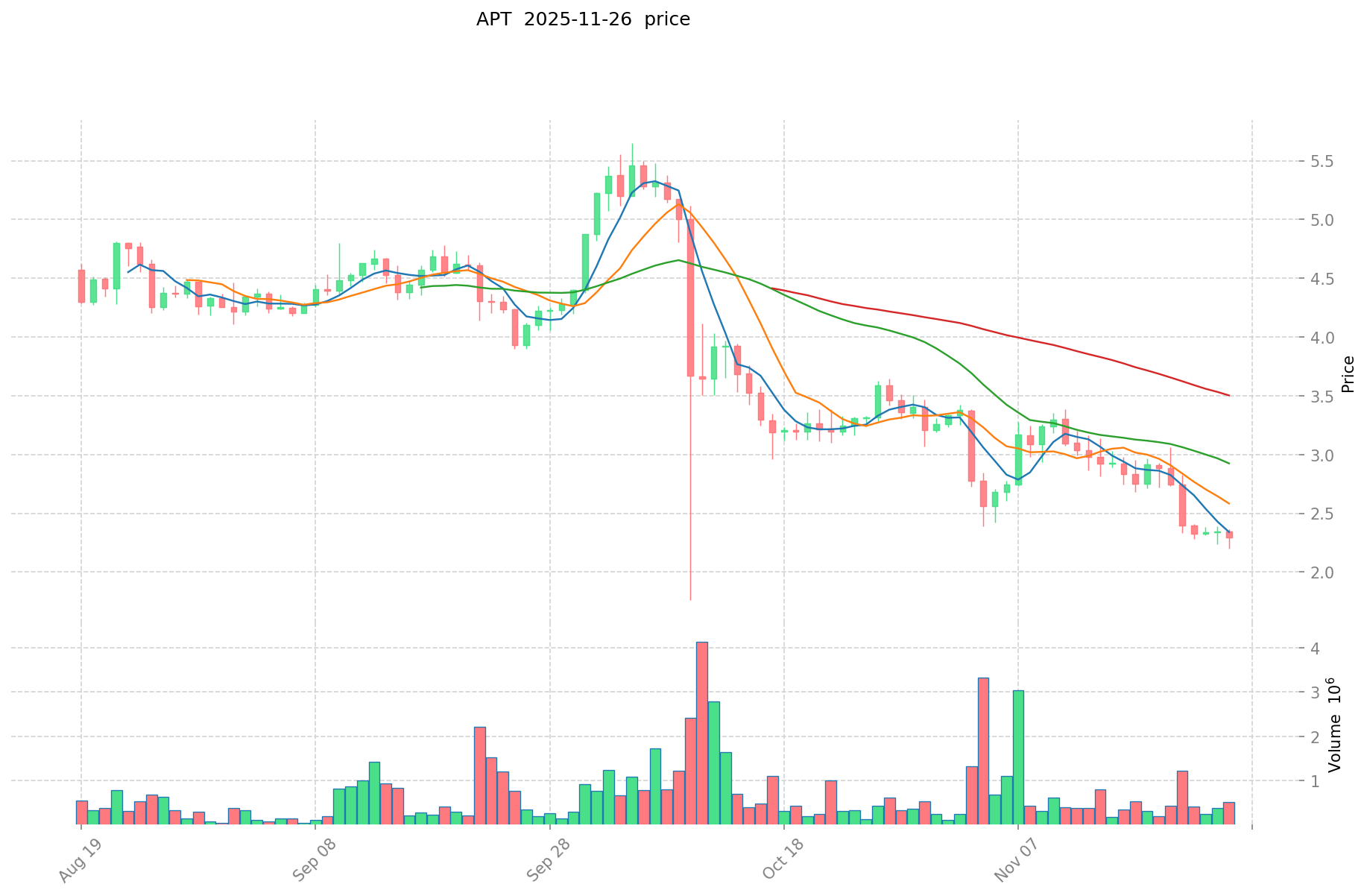HDRO vs APT: Comparing Human Development and Advanced Persistent Threats in Cybersecurity
Introduction: HDRO vs APT Investment Comparison
In the cryptocurrency market, the comparison between Hydro Protocol vs Aptos has been an unavoidable topic for investors. The two not only show significant differences in market cap ranking, application scenarios, and price performance, but also represent different positioning in the crypto asset landscape.
Hydro Protocol (HDRO): Since its launch, it has gained market recognition for its role as an infrastructure platform for yield and liquidity strategies on the Injective Network.
Aptos (APT): Introduced in 2022, it has been hailed as a high-performance PoS Layer 1 blockchain, focusing on security and scalability.
This article will comprehensively analyze the investment value comparison between HDRO and APT, focusing on historical price trends, supply mechanisms, institutional adoption, technological ecosystems, and future predictions, attempting to answer the question investors care about most:
"Which is the better buy right now?"
I. Price History Comparison and Current Market Status
HDRO (Coin A) and APT (Coin B) Historical Price Trends
- 2024: HDRO reached its all-time high of $0.349 on May 30, 2024.
- 2025: APT hit its all-time low of $2.15 on November 26, 2025.
- Comparative Analysis: In the recent market cycle, HDRO dropped from its all-time high of $0.349 to a low of $0.00335, while APT declined from its all-time high of $19.92 to its current price near the all-time low.
Current Market Situation (2025-11-27)
- HDRO current price: $0.003646
- APT current price: $2.261
- 24-hour trading volume: HDRO $12,979.70 vs APT $1,526,498.81
- Market Sentiment Index (Fear & Greed Index): 20 (Extreme Fear)
Click to view real-time prices:
- Check HDRO current price Market Price
- Check APT current price Market Price


II. Core Factors Affecting the Investment Value of HDRO vs APT
Supply Mechanism Comparison (Tokenomics)
- HDRO: Initial supply of 1 billion tokens with a deflationary model through token burns in utility activities
- APT: Maximum supply of 1 billion tokens, with initial token distribution allocated to community (51.02%), core contributors (19%), foundation (16.5%), and investors (13.48%)
- 📌 Historical pattern: Deflationary mechanisms like HDRO's burns typically support price stability during market downturns, while APT's distribution schedule may create predictable supply events that impact market cycles.
Institutional Adoption and Market Applications
- Institutional holdings: APT has attracted more institutional interest with backers including a16z, Multicoin Capital, and FTX Ventures
- Enterprise adoption: APT has gained stronger enterprise adoption through partnerships with Google Cloud, Microsoft, and NVIDIA for Web3 infrastructure development
- National policies: Both tokens operate in evolving regulatory environments, with APT's chain receiving positive regulatory reception in South Korea and Singapore
Technical Development and Ecosystem Building
- HDRO technical upgrades: Development of cross-chain payment channels and smart contracts optimization
- APT technical development: Implementation of the Move programming language, parallel execution engine, and Block-STM technology enabling over 160,000 TPS
- Ecosystem comparison: APT has a more developed ecosystem with over 400 active projects across DeFi, gaming, and infrastructure; HDRO focuses on specialized payment solutions and sustainability applications
Macroeconomic and Market Cycles
- Performance during inflation: APT has demonstrated stronger performance during inflationary periods due to its technical utility and broader ecosystem applications
- Macroeconomic monetary policy: Both tokens show sensitivity to interest rate changes, with APT experiencing higher volatility during Fed policy shifts
- Geopolitical factors: APT's broader global development team and international partnerships provide better insulation from regional political disruptions
III. 2025-2030 Price Prediction: HDRO vs APT
Short-term Prediction (2025)
- HDRO: Conservative $0.00302618 - $0.003646 | Optimistic $0.003646 - $0.00539608
- APT: Conservative $1.98792 - $2.259 | Optimistic $2.259 - $2.50749
Mid-term Prediction (2027)
- HDRO may enter a growth phase, with expected prices ranging from $0.003658425568 to $0.007693453768
- APT may enter a consolidation phase, with expected prices ranging from $2.182575771 to $2.986682634
- Key drivers: Institutional capital inflow, ETF developments, ecosystem growth
Long-term Prediction (2030)
- HDRO: Base scenario $0.004927846663678 - $0.008078437153571 | Optimistic scenario $0.008078437153571 - $0.008967065240464
- APT: Base scenario $1.908029105276274 - $3.7412335397574 | Optimistic scenario $3.7412335397574 - $5.42478863264823
Disclaimer: The information provided is for informational purposes only and should not be considered as financial advice. Cryptocurrency markets are highly volatile and unpredictable. Always conduct your own research before making any investment decisions.
HDRO:
| 年份 | 预测最高价 | 预测平均价格 | 预测最低价 | 涨跌幅 |
|---|---|---|---|---|
| 2025 | 0.00539608 | 0.003646 | 0.00302618 | 0 |
| 2026 | 0.0062390352 | 0.00452104 | 0.004068936 | 24 |
| 2027 | 0.007693453768 | 0.0053800376 | 0.003658425568 | 47 |
| 2028 | 0.00745189007976 | 0.006536745684 | 0.0058830711156 | 79 |
| 2029 | 0.009162556425262 | 0.00699431788188 | 0.003706988477396 | 91 |
| 2030 | 0.008967065240464 | 0.008078437153571 | 0.004927846663678 | 121 |
APT:
| 年份 | 预测最高价 | 预测平均价格 | 预测最低价 | 涨跌幅 |
|---|---|---|---|---|
| 2025 | 2.50749 | 2.259 | 1.98792 | 0 |
| 2026 | 3.36037545 | 2.383245 | 2.2879152 | 5 |
| 2027 | 2.986682634 | 2.871810225 | 2.182575771 | 27 |
| 2028 | 3.10500121527 | 2.9292464295 | 2.255519750715 | 29 |
| 2029 | 4.4653432571298 | 3.017123822385 | 2.26284286678875 | 33 |
| 2030 | 5.42478863264823 | 3.7412335397574 | 1.908029105276274 | 65 |
IV. Investment Strategy Comparison: HDRO vs APT
Long-term vs Short-term Investment Strategies
- HDRO: Suitable for investors focused on specialized payment solutions and sustainability applications
- APT: Suitable for investors seeking broader ecosystem exposure and potential for institutional adoption
Risk Management and Asset Allocation
- Conservative investors: HDRO: 20% vs APT: 80%
- Aggressive investors: HDRO: 40% vs APT: 60%
- Hedging tools: Stablecoin allocation, options, cross-currency portfolio
V. Potential Risk Comparison
Market Risk
- HDRO: Lower liquidity and trading volume may lead to higher price volatility
- APT: Sensitivity to broader market sentiment and macroeconomic factors
Technical Risk
- HDRO: Scalability, network stability
- APT: Centralization concerns, potential security vulnerabilities in the Move language
Regulatory Risk
- Global regulatory policies may have different impacts on both tokens, with APT potentially facing more scrutiny due to its larger market presence
VI. Conclusion: Which Is the Better Buy?
📌 Investment Value Summary:
- HDRO advantages: Deflationary model, focus on specialized payment solutions
- APT advantages: Strong institutional backing, broader ecosystem, technical innovations
✅ Investment Advice:
- New investors: Consider a higher allocation to APT due to its broader ecosystem and institutional support
- Experienced investors: Balanced portfolio with both tokens, leveraging HDRO for potential growth and APT for stability
- Institutional investors: Focus on APT for its enterprise partnerships and technical advancements
⚠️ Risk Warning: The cryptocurrency market is highly volatile, and this article does not constitute investment advice. None
VII. FAQ
Q1: What are the main differences between HDRO and APT? A: HDRO is focused on yield and liquidity strategies on the Injective Network, while APT is a high-performance PoS Layer 1 blockchain. APT has a larger market cap, higher trading volume, and a more developed ecosystem with over 400 active projects.
Q2: Which token has performed better in terms of price history? A: APT has shown better overall performance. While HDRO reached its all-time high of $0.349 in May 2024, it has since dropped significantly. APT, despite declining from its all-time high of $19.92, has maintained a higher relative price and market presence.
Q3: How do the supply mechanisms of HDRO and APT differ? A: HDRO has an initial supply of 1 billion tokens with a deflationary model through token burns. APT has a maximum supply of 1 billion tokens, with a specific distribution allocated to community, core contributors, foundation, and investors.
Q4: Which token has attracted more institutional interest? A: APT has attracted more institutional interest, with backers including a16z, Multicoin Capital, and FTX Ventures. It also has stronger enterprise adoption through partnerships with Google Cloud, Microsoft, and NVIDIA.
Q5: What are the key technical developments for each token? A: HDRO has focused on developing cross-chain payment channels and smart contracts optimization. APT has implemented the Move programming language, parallel execution engine, and Block-STM technology, enabling over 160,000 TPS.
Q6: How do the long-term price predictions compare for HDRO and APT? A: By 2030, HDRO's base scenario predicts a range of $0.004927846663678 - $0.008078437153571, while APT's base scenario predicts $1.908029105276274 - $3.7412335397574. APT shows potential for higher absolute prices, but HDRO may have a higher percentage growth from its current price.
Q7: What investment strategies are recommended for HDRO and APT? A: For conservative investors, a portfolio allocation of 20% HDRO and 80% APT is suggested. For aggressive investors, a 40% HDRO and 60% APT split is recommended. New investors may consider a higher allocation to APT due to its broader ecosystem and institutional support.
Q8: What are the main risks associated with investing in HDRO and APT? A: HDRO faces risks of lower liquidity and trading volume, which may lead to higher price volatility. APT is more sensitive to broader market sentiment and macroeconomic factors. Both tokens face potential regulatory risks, with APT potentially facing more scrutiny due to its larger market presence.
Share
Content